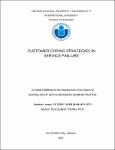| dc.description.abstract | In today’s business, to successfully attract new customers and compete with well-established enterprises, it is vital to understand customer’s wants and needs and satisfy them with products or services provided.
Therefore, to increase the understanding of prospective customers, the purpose of this thesis is to explore a phenomenon prevalent in many realms of consumer behavior—the ways that customers cope with stress and negative emotions resulted from a service failure. The focus is to investigate which coping strategies facilitate or hinder consumers’ intentions to give the service provider another chance after the failure. Structural equation modelling was used to analyze data and test hypothesized relationships.
My finding revealed that active and denial coping both have positive associations with customer’s repatronage intentions after the service failure in which there was no recovery efforts from the service provider. Furthermore, it is also interesting to note that denial coping leads to potentially more positive intentions from customers than does active coping.
Overall, this study’s results highlight the need for managers to recognize customers’ appraisals and responses during service failures as important components in developing strategies for recovery process. | en_US |


